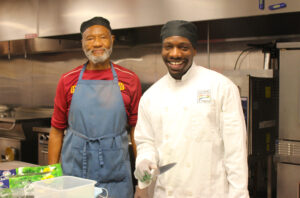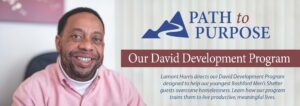
So, Lamont, give us an overview of the David Development Program.
We’ve designed this pathway of resources for all our young male shelter guests, ages 18 to 31. Since it’s the first time for most of them to be homeless, we want it to be the last. We’re looking for long-term solutions, not just quick fixes.
We want these young men to know how to avoid homelessness for the rest of their lives. We try hard to address the causes that brought them here to a homeless shelter.
Are broken relationships a common cause of homelessness for young men?
There are always some fractured relationships, and often the guys are just not doing what they know they should do—taking care of themselves or taking care of their families. They aren’t in school. They aren’t working or contributing financially where they’re living. And their moms, dads, grandmothers, or girlfriends are just done with that. Most parents or families don’t want that young man living in a homeless shelter. They just want him to grow up, and they think, “The Union Mission will straighten you out.” And most of the time we can help them move forward.
Most guys learn pretty fast that home isn’t the only place with expectations or rules they don’t like. Life has rules. They’re everywhere. Once they realize that and we talk with their families about what needs to change, it’s usually not too hard to rebuild those relationships.
But some other causes must be harder to overcome….
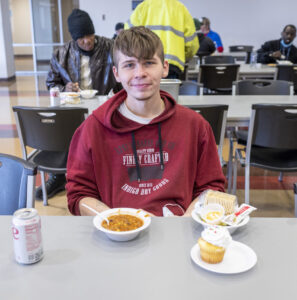
Yes, so many! We’re seeing more and more guests coming to us younger, like 18 to 23, and with greater difficulties. Some have been in foster care, but they often don’t need to stay long. They already have been assigned case workers who have a resource plan in motion, and the community offers a lot of resource assistance to them.
A fair number are getting out of jail or prison for some bad decisions, and that also comes with probation or legal problems. A few guys come straight from the hospital and still have physical disabilities. Some have addictions, not many, thank God. Here at the Mission, about 17% of our shelter guests are veterans, and that’s true in David Development, too, but most of the younger guys have left the military with “other than honorable” discharges.
And so many of our young guests are dealing with the fallout of serious traumas and ongoing mental health issues. They’ve lived through some stuff. It’s no surprise that they are angry, anxious, or depressed. But often their mental illnesses are not even properly diagnosed or treated.
We’re seeing an increase in young men who are referred to us. We’re earning a reputation as being a place where they can get real help.
So where do you start to give them that “real help”?
At the beginning. You’ve got to meet them exactly where they are to help them get to where they need to be. Once you let them know what’s expected of them, what’s not tolerated, you can show them where they might have gone wrong. Or sometimes wrong has been done to them. The key is to help them learn that it’s time for them to take responsibility for their own life, for their own future. They don’t realize that this is how grown men should act.
Many of the David Development Program participants are very guarded when they arrive at the shelter. They only come to The Union Mission because they don’t have anywhere else to go.
Many of these guys feel like victims of circumstances. A lot of them just need some encouragement, someone who believes in them. I hear a lot of “I didn’t choose to be here” and “Nobody taught me anything.” 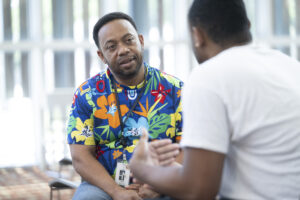 I let them know, “I understand what may have happened to you, but you can do this! You have it in you! We are here for you now. We’ll do 30% and you do 70%.”
I let them know, “I understand what may have happened to you, but you can do this! You have it in you! We are here for you now. We’ll do 30% and you do 70%.”
So what part does the Christian faith play?
It all starts with developing a relationship with the Lord and His Word, knowing that they are created in the image of God with a purpose, that they are worthy of success—that is the heart of our program. Many of these young men describe themselves as “very spiritual.” They want to learn more about God. A lot of them come here looking for that. They ask questions. They attend the chapels and Wednesday-night Bible studies. Some who were raised in church but drifted away, like many of us do, are trying to get back to their Christian faith. Those who have been hurt by church or a very religious, very strict upbringing are more cautious.
Even they are open to the truth of God’s love and that He has a good plan for their lives.
And what other services are important to their success?
We like to schedule the guys to meet with our Wellness Team fairly quickly. That’s almost always beneficial. They can get them a full physical and mental health assessment with a physician or counselor to diagnose any illnesses or disorders. Then we can plug them into services and support to help there.
Of course, basic life and relationship skills and lining up important documents are good early steps toward getting a first job, bank account, or apartment. We work to remove the obvious barriers, like a lack of having a photo ID, birth certificate, GEDs, or benefits they may qualify for.
Some have never had a real job before, or they just don’t know the value of money. They need to learn about working and getting paid, bills and budgets and savings. Or they have bad credit or no credit. Job readiness and financial literacy training are a key component of the entire David pipeline.
That sounds even more personalized than our usual shelter services.
It is. There’s much more attention!
As a mentor, I get them. I share how I’ve lived through many of the same things they have. I thought I was grown-up when I wasn’t yet.
I was a teen dad. I learned a lot of things the hard way, but I still needed some help. God prepared me with first-hand personal and professional experience that helps me get them the right resources for their age and situations.
I work with them through this entire process, and now Eric Watson is the newest addition to our David Development Team. He’s a great go-to guy who covers evenings and weekends when I cannot be here. He assists with problems and logistics. He leads some peer-to-peer meetings and does some mentoring, too. Our guys know that whenever they need assistance or prayer, someone is available, here and now in the program and also after they’ve moved out.
How long do most Davids stay here with us before moving out to independent living?
For emergency shelter, 90 days is the new baseline. It used to be 30 days, with an extension to 60, but for many first-time homeless young men, they need a little more time to stabilize and learn how never to be homeless again. A fair number of the young men in emergency shelter already have jobs and a plan. They’ve just hit a hard patch after relocating from out of state, chasing a dream that didn’t pan out, or recovering from a broken relationship. They stay with us for a while, save up their money, and find some great resources to help them move on.
Do those resources include employment assistance?
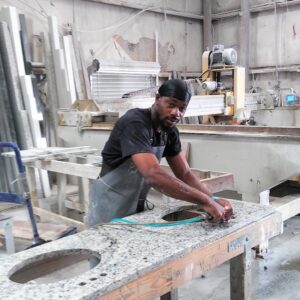
 Absolutely! Job readiness training is a key part of the program, and every participant is expected to work at least part time, but the focus is on helping them find work they will be able to do well for a long time. We want them to be building a successful career, not just holding a series of jobs. That won’t let them sustain their independence or housing in the future.
Absolutely! Job readiness training is a key part of the program, and every participant is expected to work at least part time, but the focus is on helping them find work they will be able to do well for a long time. We want them to be building a successful career, not just holding a series of jobs. That won’t let them sustain their independence or housing in the future.
We have great corporate partnerships! Over the years we’ve built strong relationships with key businesses in our region, and when they need good hires, many of them contact us. Our David program men have earned a reputation for being hard-working, motivated, and reliable. Many of them earn a living wage to start and some have even been promoted quickly to management. The industries vary from manufacturing to computers, human resources to security, hospitality to the military.
Not many of our David participants are unemployed. Right now it’s only 2 of the 21 Davids in emergency shelter. The ones who aren’t working almost always have a health reason for not doing so.
How about education?
Most of the young men in the program are high school graduates, but for those who are not, we have a partnership with the Norfolk Technical Center to help them earn their GED.
We work with just about every college in the area in all sorts of areas of study. But many of the David participants are choosing to build a solid career in trade industries like HVAC, electronics, culinary arts, or carpentry. One young man just got his welding certification and is working two good-paying jobs!
And now you’ve added a David Development Program Transitional Pipeline? Tell us more about that.
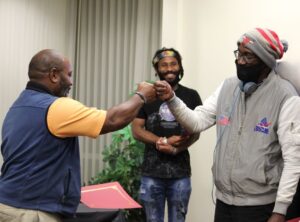
We saw a need we had to meet: a lot of young men were needing to come back to emergency shelter. Though they had access to our David Development resources when they were here, they just left too soon or the 90 days they had with us was not enough time for them to learn to succeed.
Crisis management is one of my passions—meeting people where they are and helping them to get to where they want to be. So we expanded the program for the young men who need to be here longer to benefit from all the resources. Many of the guys need more time to finish college or trade school, to clear probation or legal hurdles, to qualify for disability or VA benefits, or to save up.
The most important thing is that we teach them is to take care of themselves. … If they do not learn that, the odds are good that they’ll be homeless again.
Is this new element anything like the Mission’s other transitional programs?
Each program is a little different, but there are similarities. These young men also move into single rooms on the third floor of the shelter. We currently have five guys in the DDP Transitional, and I’d love to have up to 10. A few of the Davids in emergency shelter are inspired to do even better so they can join the transitional program upstairs.
To qualify, they must have $1,500 in their savings account, and they are required to work at least part-time, even if they are in school. Plus, they have to keep saving a portion of their earnings. They pay a $520 monthly program fee that covers their room, board, and expenses, and we continue coaching them in budgeting and money management. For those who are dads themselves, we offer parenting classes and legal aid for setting up child support. All these things help prepare them for living in the real world. And that also helps stop generational poverty.
My office is now also upstairs so I can give them more concentrated attention and mentorship. And they can drop-by to see me or Eric any time we’re there.
And how important is the aftercare that the David Development Program includes?
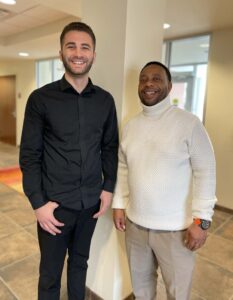 It’s critical! Aftercare lets us follow up with these young men for two years after they’ve left the Mission and we maintain the relationships we’ve built. I’m still their case manager after they leave. All the 22 guys we have in aftercare have my cell number. They know we care and will be there for them. We want them to succeed.
It’s critical! Aftercare lets us follow up with these young men for two years after they’ve left the Mission and we maintain the relationships we’ve built. I’m still their case manager after they leave. All the 22 guys we have in aftercare have my cell number. They know we care and will be there for them. We want them to succeed.
It’s one thing to obtain housing. It’s another to sustain housing. As mentors, we remind them that they need to keep working, keep addressing the things that troubled them, keep seeking God, keep being a responsible adult. That’s how they’ll avoid being homeless again.
Our aftercare check-ins help them keep their new lives heading in a good direction with ongoing resources, connections, and encouragement. Most of the men in aftercare are really working on their futures! I love it when the guys who have moved out call me to tell me they’re doing well even before I have the chance to check back on them. That’s good stuff!
What enhancements do you hope to add to the David Development Program to make it even better?
I’m grateful for the progress we’ve made in 7 years. Adding an assistant and a transitional program element are great achievements. But I still have big dreams that will take some extra financial support.
First, I’d like to be able to offer some more mental health support. Our funding for program-specific counseling ended, so now our young men have only the same offerings that all our male shelter guests have. They are great resources, especially those on anger management, overcoming trauma, and relationship rebuilding. But most of the classes are scheduled during the day when most of our young guys are working, so it’s hard for them to be able to attend. We could do so much with resources geared toward meeting their needs if they were scheduled for after regular business hours.
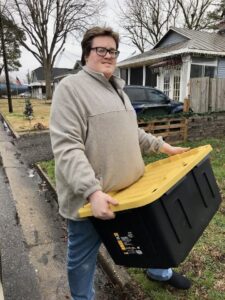 An Aftercare Emergency Fund would also be great! Most of our participants who have moved into housing do extremely well, but sometimes the unexpected happens. They may need some transportation or food support, or help with continuing education costs. When guys change jobs to take better opportunities, they’re left without a paycheck in between. They sometimes need some rent or utilities assistance, or help paying for things like new uniforms or certification classes. Some young men still have some past legal issues to clear, or travel expenses to work on reconciling with their family. Having $10,000 for needs like this could make a real difference.
An Aftercare Emergency Fund would also be great! Most of our participants who have moved into housing do extremely well, but sometimes the unexpected happens. They may need some transportation or food support, or help with continuing education costs. When guys change jobs to take better opportunities, they’re left without a paycheck in between. They sometimes need some rent or utilities assistance, or help paying for things like new uniforms or certification classes. Some young men still have some past legal issues to clear, or travel expenses to work on reconciling with their family. Having $10,000 for needs like this could make a real difference.
My wishlist also includes some sponsorships or funding for David Development outings. I’d love to provide a chance for current and former Davids to get together off-campus from time to time for a cookout, a restaurant meal after church, or a cultural excursion like a concert or museum visit. Get-togethers like that let the men bond as they discuss their experiences and learn from their peers what’s been successful for them. It’s a real encouragement to them to help out others going through homelessness.
I’d love to talk with anyone who would like to help in any of these areas. Changing a young man’s life now means changing generations and our community for the future!

